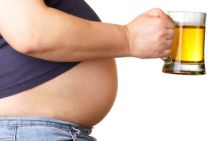NCD Watch
Waistline Alert for Drinkers
28 May 2012 (Mon)
 "Beer belly" is a common expression which associates beer drinking with belly fat. As a matter of fact, there is some scientific basis for it.
"Beer belly" is a common expression which associates beer drinking with belly fat. As a matter of fact, there is some scientific basis for it.
Beer is a common alcoholic beverage. However, many beer drinkers may not be aware that alcohol in the beer has a high energy content. Alcohol carries 7kcal per gram, which is almost twice as many calories as carbohydrates e.g. sugar or proteins do (both contain 4kcal/g). A 330ml can of regular beer of 5% alcohol by volume contains about 13 grams of alcohol. Only taking alcohol (the major calorie content) into consideration, assuming a person drinks 2 cans of beer every day for 3 months, the amount of energy gained from the alcohol intake will be approximately 16500kcal, which is equivalent to approximately 5lbs of fat tissue. Moreover, people usually drink beer or other alcoholic beverages together with snack foods, such as peanuts, potato chips, etc. These fatty snacks will further contribute to excess weight gain.
Excessive fat will accumulate in various parts of the body, particularly around the belly, resulting in "central obesity". The Behavioural Risk Factor Survey 2011 of the Department of Health observed that 11.9% of community-dwelling adults aged 18-64 in Hong Kong were centrally obese i.e. having a self-reported waist circumference (WC) greater than the sex-specific cut-off points of WC (<90cm for men and <80cm for women) for adult Asians as recommended by the World Health Organization. People with central obesity are at higher risk of developing conditions such as coronary heart disease, stroke, high blood pressure, diabetes, and certain cancers. Therefore, people who drink alcoholic beverages, be it beer, wine, spirits or other types of alcohol, should be aware of the associated health risks.
Apart from alcohol consumption, eating too much and having a sedentary lifestyle also contribute to a beer belly. Therefore, if you wish to achieve or maintain a healthy waistline, you should maintain a healthy diet, stay physically active and limit your alcohol consumption. And of course, you can choose not to drink at all!






































